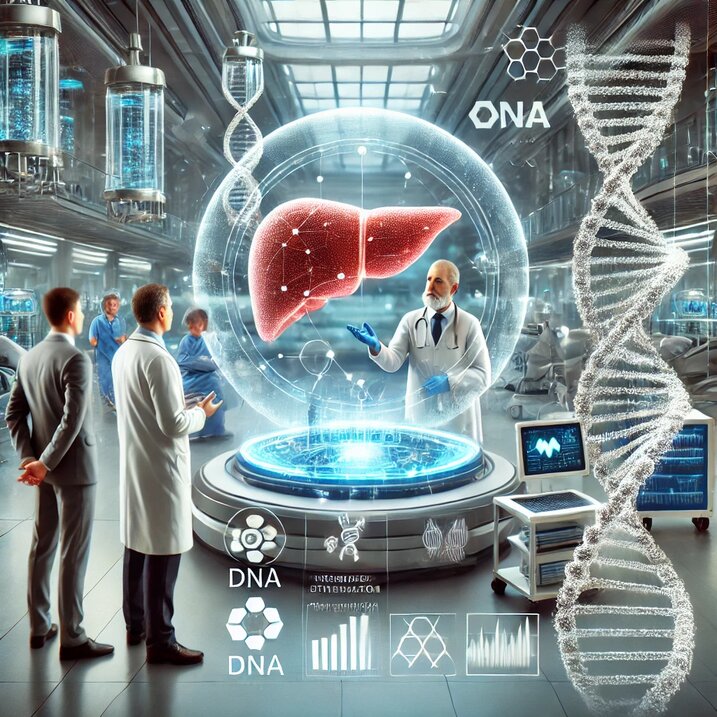What is Gene Therapy for Liver Cancer?
Gene therapy is an innovative approach to treating liver cancer by modifying or replacing faulty genes responsible for cancer progression. Unlike traditional treatments, gene therapy targets the root cause of the disease at a genetic level, offering a promising alternative for patients with advanced or treatment-resistant liver cancer. This therapy involves delivering therapeutic genes directly into cancer cells to inhibit tumor growth, restore normal cell function, or enhance the immune system’s ability to fight cancer.
Medical disclaimer: This content is for general awareness and does not replace a doctor’s consultation. For diagnosis or treatment decisions, consult a qualified specialist.

How Does Gene Therapy Work?
The mechanism of gene therapy involves introducing genetic material into the patient’s liver cells using vectors, which are often modified viruses. These vectors carry therapeutic genes designed to disrupt cancer cell growth, induce apoptosis, or enhance the body’s natural defenses. Some gene therapy approaches also aim to block angiogenesis, cutting off the tumor's blood supply and limiting its ability to grow. This precise targeting makes gene therapy a revolutionary approach in liver cancer treatment.
Types of Gene Therapy for Liver Cancer
Several types of gene therapy are currently being explored for liver cancer treatment:
1. Gene Replacement Therapy: Replaces defective genes with healthy ones to restore normal cell function. 2. Suicide Gene Therapy: Introduces genes that make cancer cells more susceptible to drugs, effectively killing the tumor. 3. Immunomodulatory Gene Therapy: Boosts the immune response by delivering genes that stimulate the immune system to target cancer cells. Each of these approaches is tailored to disrupt specific cancer mechanisms while preserving healthy tissues.
Benefits of Gene Therapy in Liver Cancer Treatment
Gene therapy offers several advantages over traditional liver cancer treatments. Its ability to target specific genetic abnormalities ensures minimal damage to surrounding healthy tissues. Additionally, it has shown promise in managing drug-resistant cancers and reducing the likelihood of recurrence. Patients undergoing gene therapy often experience fewer side effects compared to chemotherapy or radiation, making it a safer and more tolerable option. These benefits highlight the potential of gene therapy as a game-changer in liver cancer care.
Challenges in Implementing Gene Therapy
Despite its potential, gene therapy faces several challenges in clinical implementation. One major hurdle is the safe and effective delivery of therapeutic genes to the targeted liver cells. Using viral vectors comes with risks, such as immune system reactions or unintended effects on healthy cells. Additionally, the high cost of development and limited availability of gene therapy pose significant barriers to widespread adoption. Researchers are actively addressing these challenges by developing non-viral delivery systems and optimizing treatment protocols to make gene therapy safer and more accessible.
Gene Therapy Success Stories in Liver Cancer
There have been several promising cases demonstrating the efficacy of gene therapy in liver cancer treatment. Clinical trials have shown that certain therapies, such as suicide gene therapy, can effectively reduce tumor size and improve survival rates in patients with advanced liver cancer. In some studies, combining gene therapy with immunotherapy has enhanced the immune system’s ability to target and destroy cancer cells, offering hope for patients with drug-resistant tumors. These success stories highlight the transformative potential of gene therapy in liver cancer care.
Future Prospects of Gene Therapy in Liver Cancer Treatment
The future of gene therapy in liver cancer looks promising, with ongoing advancements aimed at improving its efficacy and accessibility. Researchers are exploring personalized gene therapy approaches, which tailor treatments to an individual’s genetic profile. New delivery technologies, such as nanoparticles, are being developed to ensure safer and more precise gene transfer. With continued investment in research and clinical trials, gene therapy is expected to become a standard treatment option for liver cancer in the coming years.

Cost of Gene Therapy for Liver Cancer in India
Gene therapy is an advanced treatment option, and its cost in India depends on the type of therapy and the healthcare facility. On average, gene therapy for liver cancer can range from ₹10,00,000 to ₹20,00,000 per treatment cycle. While this is a significant expense, India’s comparatively lower medical costs and availability of financial aid programs, such as Ayushman Bharat, make it a more accessible option for patients. Many hospitals offer payment plans or financial counseling to support patients in managing treatment costs effectively.
Liver Cancer Treatment Effective Therapies
Gene therapy is often used in conjunction with other advanced liver cancer treatments to enhance its effectiveness. Below are some of the most widely utilized therapies:
Immunotherapy
Immunotherapy for liver cancer strengthens the immune system’s ability to fight cancer cells. Combining immunotherapy with gene therapy has shown promising results in improving treatment outcomes. Costs range from ₹2,50,000 to ₹5,00,000.
Targeted Therapy
Targeted therapy for liver cancer blocks specific pathways essential for cancer growth. When paired with gene therapy, targeted therapy addresses both systemic and localized aspects of liver cancer. Costs vary depending on the drug, typically ranging from ₹2,50,000 to ₹6,00,000.
Chemoembolization (TACE)
TACE therapy for liver cancer combines chemotherapy with embolization to directly target liver tumors. It complements gene therapy by reducing tumor size and creating a better environment for genetic interventions. Costs typically range from ₹2,00,000 to ₹3,50,000 per session.
Radioembolization (TARE)
TARE therapy for liver cancer delivers radioactive particles to the tumor, providing a targeted radiation approach. It is often used alongside gene therapy for advanced liver cancer cases. Costs range from ₹4,00,000 to ₹6,00,000.
Recommended Reading for Liver Cancer Patients
Explore these articles to learn more about liver cancer treatments and advancements:
Combining Gene Therapy with Conventional Treatments
Gene therapy is rarely used as a standalone treatment for liver cancer. Instead, it is often combined with conventional therapies such as chemotherapy, radiation, or immunotherapy to enhance its effectiveness. For example, combining gene therapy with targeted therapy helps address both localized and systemic cancer progression. These combination approaches are critical for improving outcomes, especially in advanced-stage liver cancer.
Gene Therapy in Clinical Trials for Liver Cancer
Gene therapy for liver cancer is still in its experimental phase and is being rigorously tested in clinical trials. These trials focus on evaluating the safety and efficacy of different gene therapy approaches, such as viral vectors and nanoparticle delivery systems. Participation in clinical trials offers patients access to cutting-edge treatments that may not yet be widely available. Successes in these trials are paving the way for gene therapy to become a mainstream option in liver cancer care.
The Impact of Gene Therapy on Survival Rates
Preliminary data from clinical studies indicate that gene therapy has the potential to significantly improve survival rates for liver cancer patients. By targeting the genetic mutations responsible for tumor growth, gene therapy reduces the likelihood of recurrence and enhances the effectiveness of other treatments. Patients who undergo gene therapy in combination with systemic treatments often experience longer progression-free survival compared to those receiving conventional therapies alone.
The Future of Gene Therapy Accessibility in India
India is rapidly advancing in the field of gene therapy, with several research institutions and hospitals exploring its potential for liver cancer treatment. While currently limited to select centers, the increasing availability of clinical trials and advancements in biotechnology are expected to make gene therapy more accessible. Collaborative efforts between government programs, healthcare providers, and research organizations aim to reduce costs and expand the reach of gene therapy to a broader patient population.
Top Hospital and Doctors for Liver Cancer Treatment in India
India is home to some of the best liver cancer treatment hospitals in india, offering world-class care at affordable prices. Prominent hospitals like Apollo Hospitals, Fortis Healthcare, and Tata Memorial Hospital are renowned for their advanced treatment facilities and cutting-edge therapies such as Immunotherapy, Targeted Therapy, and Radiofrequency Ablation (RFA).
The cost of liver cancer treatment in India is significantly lower compared to other countries, starting from INR 2,50,000 for minimally invasive therapies and going up to INR 20,00,000 for advanced options. For more details, check liver cancer treatment costs in India.
Some of the top doctors specializing in liver cancer include Dr. Arvinder Singh Soin, Dr. SKS Marya, and Dr. Ravi Mehrotra, who are known for their expertise in surgical and non-surgical approaches. Discover more about the best liver cancer doctors in India.
Explore detailed options for liver cancer care and therapies by visiting best liver cancer treatment in India.
Frequently Asked Questions (FAQs)
What makes gene therapy unique for liver cancer treatment?
Gene therapy targets the root cause of liver cancer at a genetic level, offering precise treatment with minimal side effects compared to conventional therapies.
Who is eligible for gene therapy in liver cancer?
Patients with advanced or treatment-resistant liver cancer, or those not responding to traditional treatments, may be eligible. A detailed evaluation by an oncologist is necessary.
What are the side effects of gene therapy?
Common side effects include mild immune reactions or inflammation at the treatment site. These effects are usually temporary and manageable.
How much does gene therapy for liver cancer cost in India?
Gene therapy costs in India range from ₹10,00,000 to ₹20,00,000, depending on the type of therapy and healthcare facility.
Can gene therapy be combined with other treatments?
Yes, gene therapy is often combined with immunotherapy, targeted therapy, or TACE to improve its effectiveness in managing liver cancer.
Is gene therapy widely available in India?
Gene therapy is currently available at select advanced oncology centers in India. Ongoing research is expected to make it more accessible in the future.
Discover the Best Oncologists and Cancer Hospitals in India
When it comes to cancer treatment, finding the right specialist and hospital can make a significant difference in the outcome. In this blog, we have compiled a list of the top oncologists and cancer hospitals across major cities in India, ensuring that you have access to the best care available.
Top Oncologists in Major Cities
For those seeking expert oncologists, we have identified the best specialists in key cities:
Leading Cancer Hospitals
In addition to finding the right specialist, choosing the right hospital is crucial for comprehensive cancer care. Here are the top hospitals in major cities:
Get more indepth information on Cancer treatments and their costs
Conclusion
Finding the right oncologist and hospital is the first step in your cancer treatment journey. Explore the links above to learn more about the top specialists and hospitals in your area.